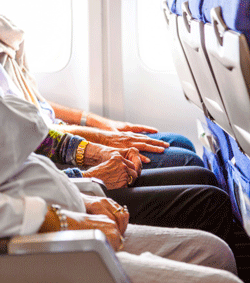 Traveling should be one of the perks of growing older and living well. Whether flying to see the grandkids or looking for some beach time, seniors, even if you stay active, can face a few age-related problems. Consider ways to make the trip smoother when you are flying the friendly skies.
Traveling should be one of the perks of growing older and living well. Whether flying to see the grandkids or looking for some beach time, seniors, even if you stay active, can face a few age-related problems. Consider ways to make the trip smoother when you are flying the friendly skies.
Plan Well in Advance
Growing older means you might need a little more time to get things done. The sooner you start planning, the better prepared you will be for travel. This also gives you a chance to check around for the best senior discounts. Most airlines don’t offer senior plans, but different organizations, such as AARP, might have a discount program.
Forward thinking also allows you to make any necessary special arrangements.
- Low-salt meals
- An aisle seat to make bathroom breaks smoother
- Wheelchair service at any connecting airports
- Assistance getting through security and finding the right gate
- Special storage for a wheelchair or walker
- Seats with extra legroom
Put together a list of special needs before buying tickets. When you book, make as many requests as possible. If you wait until you get to the airport, it might be too late.
Make Your Ground Transportation Plans Ahead of Time, Too
It is easy to underestimate how exhausting air travel can be, especially if you are staying active and living well in your retirement.
Make all your ground transportation arrangements in advance, so you don't have to worry about finding a cab or renting a car after the flight. Know who is picking you up at the airport or get familiar with two or three taxi companies in the area.
You can also opt for a transportation service designed specifically for senior travelers—iTNAmerica is a network of community-based transportation options for seniors that can help you get a ride to wherever you are going.
Getting Around the Airport
Don’t forget to make getting from the curb to the airplane as easy as possible, too. Take advantage of curbside luggage check-in when available. Even if you don’t need a wheelchair, you may still be able to get a ride to the gate. Ask the agent to schedule a cart to pick you up at the door.
When the time comes to deplane, wait and let everyone else get off first. This way you have plenty of time to gather your stuff without the stress of people trying to push past you. If you wait, a flight attendant can help make sure you have everything you need and provide assistance to the gate.
Medical Considerations
There may be airline restrictions that can affect your health. Most airlines, for example, will not allow oxygen on flights because it is a hazardous material. If they do allow supplemental oxygen, they may have regulations you need to follow.
If you travel with prescription medications, you might be required to bring documentation, especially if you need your meds during the flight. It is a good idea to keep a folder with you that has a summary of your medical problems, a list of medications you take, your Medicare card and contact information for your healthcare provider. This way everything you need is in one central location in case of an emergency.
You may also want to consider the following:
- Keep the medication in the original containers when traveling, so a healthcare professional can immediately see what you take.
- Don’t pack medication in luggage that you plan to check. Keep it with you.
- Wear an alert bracelet if you have any significant health problems.
- Let the airport authorities know if you have any implanted medical devices such as a pacemaker, cardioverter-defibrillator or back brace. This way they can scan you safely.
The Transportation Security Administration has a helpline you can call if you need information on transporting medical devices or medication.
Air travel can be either fun or stressful, depending how well you plan. Start making your arrangements as soon as possible, so when the day comes, all you have to do is sit back and enjoy living well in your golden years.












